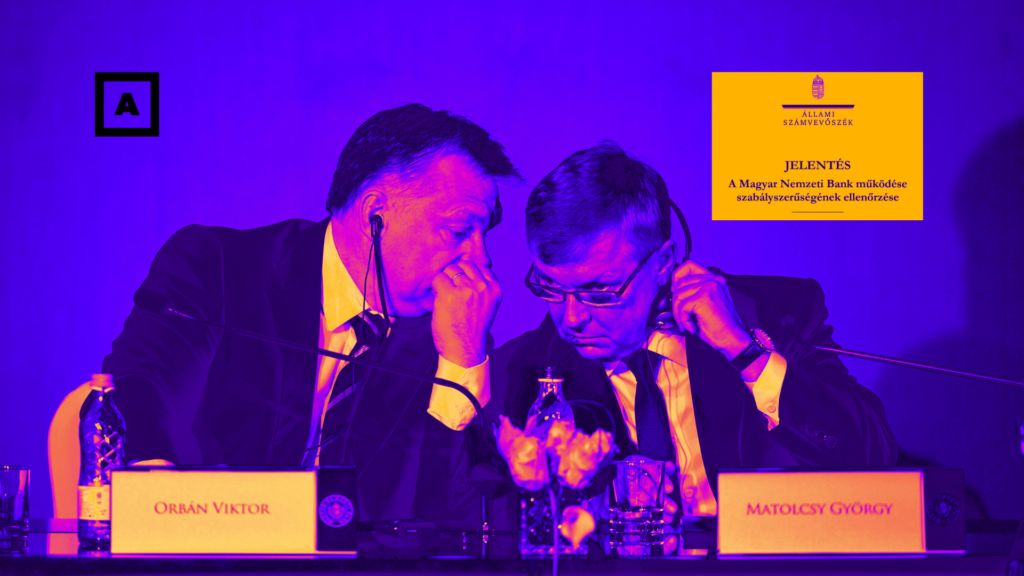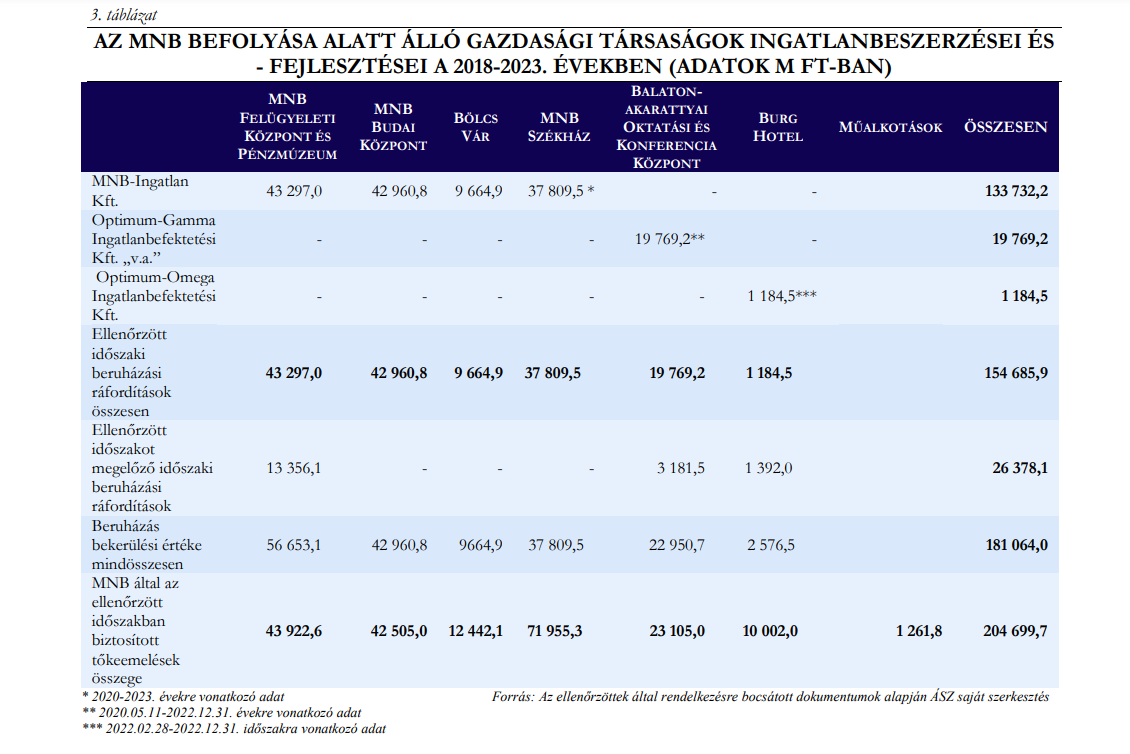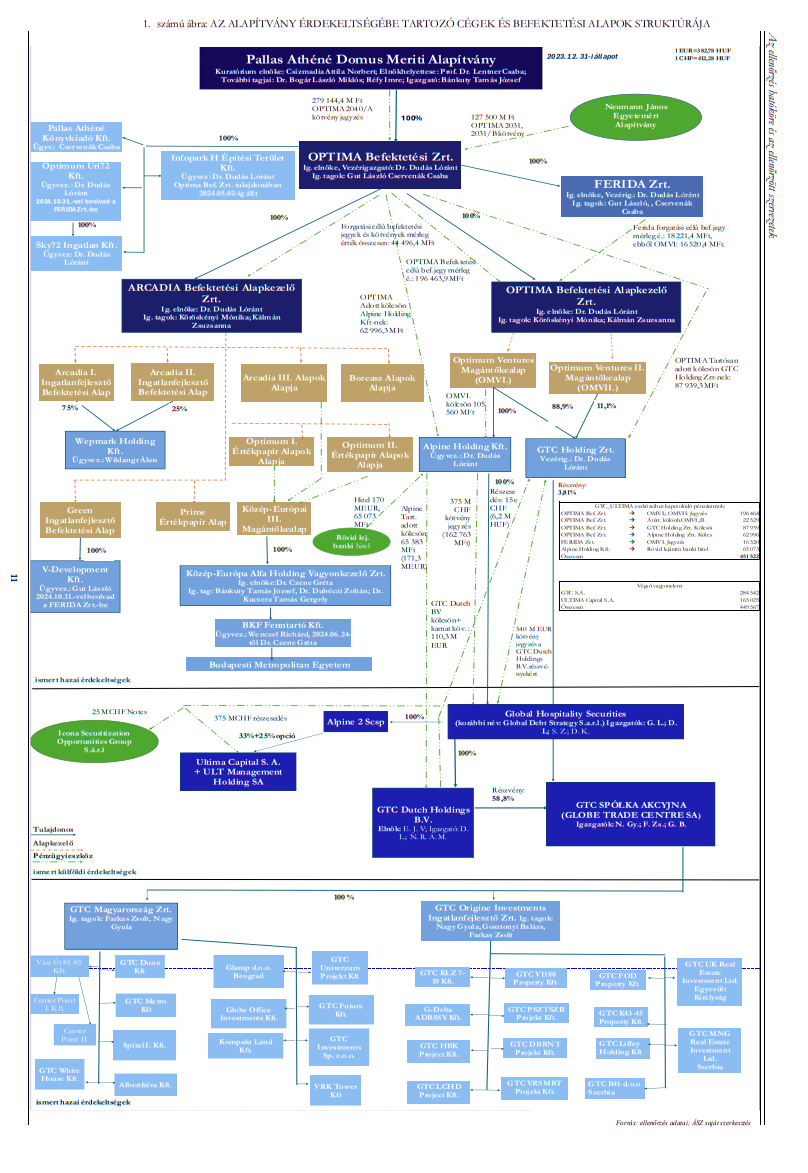The https://english.atlatszo.hu use cookies to track and profile customers such as action tags and pixel tracking on our website to assist our marketing. On our website we use technical, analytical, marketing and preference cookies. These are necessary for our site to work properly and to give us inforamation about how our site is used. See Cookies Policy
Matolcsy’s downfall – the State Audit Office investigates Central Bank spending
György Matolcsy was the head of the Hungarian National Bank (MNB) for over 12 years. During this time, he spared no expenses spending the public’s money, setting up opaque foundations, spending billions on real estate, and artwork, and signing lucrative contracts with his son’s friend’s companies. All this did not bother the government for years, until Matolcsy started criticizing PM Orbán’s economic policies. Soon, he was removed from his position and the bank is now under a State Audit: unsurprisingly, they found a lot of irregularities and hundreds of billions of forints missing.
For over a decade, life for Matolcsy was beautiful. The president of the Hungarian National Bank (MNB) between 2013 and early March 2025 lavishly spent public funds like there was no tomorrow; billions on real estate and paintings and sculptures. He established opaque central bank foundations and signed numerous high-value contracts with companies linked to his son’s friend. For years, the government looked the other way.

The luxury came to an abrupt stop, however, when Matolcsy began to criticize Orbán’s economic policies. It became apparent that the secure friendship was not so secure after all – the relationship deteriorated, leading to his removal from the MNB.
Orbán clearly had his feelings hurt – the State Audit Office launched an investigation into Matolcsy’s tenure at the central bank. To no one’s surprise, they uncovered numerous irregularities and financial losses amounting to hundreds of billions of forints.
The newly published audit reports contain little new information. Independent media has been onto Matolcsy’s activities for a while now.
He man did little to hide his passion projects like billion-forint real estate deals, kitschy artwork and gaudy statues, and the enrichment of son Ádám and friends.
The lesson is obvious – one can get away with near anything as long as they’re in with the government. Just don’t – for the love of God, don’t – fall out with them.
The State Audit Office (ÁSZ) Began Its Investigation
György Matolcsy was first appointed as the president of the Hungarian National Bank (MNB) by Fidesz in March 2013, and his mandate was extended for another six years in 2019, keeping him in office until early March 2025.
His long stint ended there – most likely because he began to sharply criticize Orbán’s economic policies in 2022.
In November 2024, Viktor Orbán announced that the then-Minister of Finance, Mihály Varga, would replace Matolcsy. Varga was officially appointed as the central bank’s president just before Christmas and took over in early March. Things happen quickly when they happen (except hospital waitlists, those continue to move slowly).
Shortly before Matolcsy’s departure, one of the central bank’s asset managers was transferred to his son’s friends, prompting Varga to promise a thorough investigation. He also dismissed Matolcsy’s associates from the MNB’s foundation and company.
However, the State Audit Office (ÁSZ) had already begun scrutinizing the central bank’s activities during Matolcsy’s presidency well before his removal. On March 19, 2025, the ÁSZ published three reports on its website:
- On the operation of the MNB;
- On the financial management of the Pallas Athéné Domus Meriti Foundation (PADME), owned by the central bank;
- On the investments of the Neumann János University Foundation, linked to Matolcsy.
The timing of the reports—just two weeks after Matolcsy’s dismissal—suggests a politically motivated move, possibly as retribution for his criticisms of the government’s economic policies.
Attached correspondences reveal that the ÁSZ had been investigating the MNB’s affairs since as early as November 2023. This raises the question of why the investigations weren’t conducted earlier and why the findings were only made public now.
Opaque and Overpriced Real Estate Deals
The report titled “Audit of the Legality of the Hungarian National Bank’s Operations” contains little new information, as independent media—Átlátszó at the helm—had already reported extensively on these issues.
The 121-page document includes a 10-page summary and 20 pages of appendices. The audit covered:
- The MNB’s operations from 2020 to 2022,
- Real estate and other acquisitions from January 1, 2014, to December 31, 2023,
- MNB-Ingatlan Kft.’s activities from May 31, 2019, to December 31, 2023,
- Optimum-Gamma Ingatlanbefektetési Kft.’s transactions from May 11, 2020, to April 30, 2023,
- Optimum-Omega Ingatlanbefektetési Kft.’s operations from February 28, 2022, to December 31, 2022.
The audit found that the MNB’s real estate investments and renovations did not adhere to principles of financial prudence, failing to align with the country’s general fiscal conditions and government financial practices. The MNB also neglected to consider its own significant financial losses, the long-term negative effects of its investments, and the impact of external economic changes, such as sharp price increases in the construction sector.
According to the ÁSZ’s findings:
- MNB-Ingatlan Kft. and its subsidiaries spent 154.7 billion forints on real estate investments between 2019 and 2023,
- The budget for the reconstruction of the MNB’s headquarters grew significantly over time, rising from 55 billion to over 100 billion forints, nearly doubling,
- Employee retreats at the Balatonakarattya Educational and Conference Center (BOKK) cost 1.9 million forints per worker in 2023 and 2.2 million forints in 2024, on top of the annual 800,000-forint SZÉP card allowance per employee,
- Many of these investments were non-transparent, as they were managed through MNB-owned companies, meaning the central bank’s supervisory board only learned of them after the fact.
A particularly striking finding: 80 to 90 percent of MNB’s real estate projects were carried out by companies linked to Matolcsy’s son, Ádám, and his friends. The report specifically names Somlai Invest Zrt., RAW Development Kft., and Raw Facility Kft., highlighting that:
- Between 2018 and 2022, 70-95% of Somlai Bálint’s companies’ revenue came from the MNB or its subsidiaries.
- RAW Development Kft.’s revenue from real estate projects was 92-93% from MNB in 2018 and 2020-2022, and 73% in 2019.
- Somlai Invest Zrt.’s revenue was 100% from MNB in 2018, 95% in 2019, and 58-96% in 2021-2022.
These figures, based on data requested from the tax authorities, indicate a pattern of financial favouritism, further fuelling suspicions of corruption and mismanagement within the central bank during Matolcsy’s tenure.
Billions spent on paintings and sculptures
“The MNB approved capital increases of 5.9358 billion forints in 2020 and 889 million forints in 2020 and 2021 for the acquisition of artwork (sculptures) and the purchase of a total of 1,045 pieces of art for MNB-Ingatlan Kft.,” according to the State Audit Office (ÁSZ) report.
The report’s annex lists all the paintings purchased by the MNB’s real estate company in recent years. In 2023, MNB-Ingatlan Kft detailed their collection as follows:
- 109 artworks at the MNB Buda Center (Krisztina Blvd. 55.),
- 91 artworks at the MNB Supervisory Center (Krisztina Blvd. 6.),
- 6 artworks at an MNB property in Buda Castle (Úri St. 21., “Bölcs Vár”),
- Some pieces were displayed at various exhibitions,
- Others were stored in a private warehouse.
The State Audit Office (ÁSZ) report noted:
“According to the proposals submitted to the Board of Directors, the sole purpose of the purchases was to create a high-quality office environment. However, in the decision-making process regarding the acquisition of artworks and artistic pieces, the MNB did not demonstrate compliance with responsible financial management.”
The report also mentions sculptures purchased from Gábor Miklós Szőke, a sculptor favoured by the government, who also supplied the Hungarian Defence Forces’ turul bird statues.
During the audited period, the MNB acquired the “Bear-Bull” and “Lion” sculpture groups for 847 million forints, and the “Golden Train” and “Miraculous Deer” sculptures for 414.6 million forints – both financed through capital increases at the MNB’s real estate company.
Matolcsy claims he managed finances frugally
The ÁSZ report includes an attachment: a letter from László Windisch, president of the State Audit Office (ÁSZ), dated November 17, 2023, in which he requested Matolcsy to “establish (or restore) a controlled environment that (…) adequately ensures the prevention of the wasteful use of public funds,” review the construction contracts signed up to that point, spend additional amounts on the renovation of the MNB headquarters only if the first two points have already been implemented, and ensure the supervisory board’s right to oversight.
Matolcsy responded to this on November 29, 2023, stating that MNB-Ingatlan Kft. would have the MNB make decisions regarding all matters reaching 100 million forints, the supervisory board would review the proposals, they would examine the contract for the headquarters renovation, and—for now—they would not sign the modification of the agreement with Raw Development Kft., the company carrying out the renovation.
However, Matolcsy then indicated that he did not like the ÁSZ letter, arguing that the audit by the State Audit Office “goes beyond the framework of examining legality” and that the claims made in the letter signed by Windisch had been recorded “without a legal and factual basis.”
Nearly a year and a half passed without any developments, until suddenly, just before Matolcsy’s mandate at the MNB was about to expire, in February 2025, the ÁSZ sent him the draft report. On February 27, Matolcsy sent his remarks back to the State Audit Office, stating that in several points, the ÁSZ’s conclusions were incorrect.
Matolcsy did not even attempt to defend the MNB contracts awarded to his son’s circle of friends.
His successor, Mihály Varga, received a response to these remarks from László Windisch on March 17, 2025, who replied to almost everything in the same way: “the finding of the ÁSZ regarding the lack of cost-effective management is valid.”
Anyone interested in delving into the full ÁSZ report on the MNB can do so below:
Foundation investigated
In 2013, shortly after Matolcsy’s arrival, the central bank began establishing six Pallas Athéné foundations, which were operating at full capacity by 2014. The primary purpose seemed to be the disappearance of public funds: they spent billions on purchasing and renovating lavish properties and signing various contracts, while the MNB insisted that the state assets given to the foundations had become private property. As Fidesz politician Lajos Kósa put it at the time: “It has lost its public funds nature.”
In 2019, the foundations merged into the single Pallas Athéné Domus Meriti Foundation (PADME), about which the State Audit Office (ÁSZ) has now released a separate report. This report is nearly three times the length of the 121-page MNB report—coming in at 373 pages—and by page 11, it features a company network diagram that even seasoned investigative journalists rarely come across:
Back in 2015, the six separate MNB foundations at the time established a joint company, the predecessor of Optima Investment Zrt. (then called Pallas Athéné Domus Optima Zrt.), to handle asset management, real estate operations, and other tasks.
By 2023, this company had six subsidiaries, and one of them even had a subsidiary of its own.
According to the ÁSZ report, these companies—referred to as asset managers—were responsible for
“the lawful representation of ten investment funds in total, including two private equity funds, three real estate funds, and five securities funds.”
The ÁSZ mapped out this entire network, along with “the domestic and international interests held by these funds and the major financial transactions between them,” into a single massive diagram.
According to the report, Optima Zrt. managed the nearly 500 billion forints in public funds entrusted to it in a completely non-transparent manner through the complex corporate network known as the “Optima Group.” It made unfounded investment decisions and generated significant financial losses.
“During the audit, based on the uncovered facts, the ÁSZ identified suspicions of multiple crimes,”
the document states.
“A Situation Threatening Insolvency”
“Considering that in January 2024, the NJE Foundation’s Board of Trustees decided to exercise its right to sell the bonds it held, but Optima Investment Zrt., as the obligated party, was unable to fulfil this obligation, a situation threatening insolvency has since developed.” – writes the ÁSZ (State Audit Office), which also cited two internal documents from Optima in connection with this matter.
In February 2024, the Optima Group stated that “the current situation can only be resolved by immediately involving external funding.” Then, in March 2024, the company informed the Hungarian National Bank (MNB) that it would not be able to meet an upcoming €32 million payment obligation.
“Optima Investment Zrt. is attempting to address the insolvency risk by holding separate negotiations with the NJE Foundation,” states the ÁSZ report. However, according to the document, this will not be sufficient:
“An internal audit assessing liquidity projected an 80.5-billion-forint liquidity shortfall by the end of June 2025” for Optima Zrt., not including the 127.5 billion forints that the company still owes to NJE.
The ÁSZ also notes that in April 2024, nearly a year ago, the PADME Board of Trustees approved a Reorganization Plan for 2024 and 2025, aiming to restore balance between revenues and expenditures under changed economic conditions.
However, a subsequent Status Report from Optima Investment Zrt. emphasized that “based on revenue and funding opportunities, as well as existing liabilities, it appears that without external assistance, there is currently no viable way to resolve the PADME/Optima Group’s financial situation in a satisfactory manner.” The company estimated that an additional 400 billion forints in capital injections would be necessary.
Matolcsy’s Son’s Friends Get Rich
Following the list of business decisions that resulted in massive losses, one must ask: where did the hundreds of billions of forints managed by PADME and its subsidiary, Optima, go? The ÁSZ report sheds light on this as well.
First, the Optima Group was rife with internal conflicts of interest.
“As of December 31, 2023, individuals holding board positions at Optima Investment Zrt. simultaneously held executive positions at 12 other affiliated companies. Moreover, those making investment decisions and those signing agreements on behalf of partners were often the same individuals,”
the report states.
Second, the State Audit Office explicitly states that the inner circle of Matolcsy’s son, Ádám Matolcsy, directly benefited from these financial manoeuvres.
The Hungarian subsidiaries of GTC S.A., an indirectly owned company of PADME, carried out real estate transactions where “the same investment funds managed by QUARTZ Investment Fund Management Zrt., or companies linked to them, appeared repeatedly as either buyers or sellers.” PADME also rented a historic building on Úri Street in Budapest from a company owned by the same investment funds, at an average monthly cost of 43 million forints, including operational expenses, in 2023.
The owner of QUARTZ Investment Fund Management Zrt. (through Dry Immo Real Estate Management Kft.) is the FELIS Private Equity Fund, which is owned by István Száraz, a close friend of Ádám Matolcsy. This connection is further reinforced by the fact that Száraz previously owned QUARTZ and Dry Immo, and another company he owns, Dry Digital Kft., holds Frank Digital Kft., a firm that for years won Hungarian National Bank (MNB) communication tenders in a row. These tenders were mentioned in the ÁSZ report, but not examined in depth, as they were contracted before the audited period.
Furthermore, based on data from the Hungarian tax authority (NAV), the ÁSZ determined that the Hungarian project companies of GTC S.A. spent billions of forints on planning, architectural, and construction services, with contracts consistently awarded to the same company: Raw Development Kft. This pattern was also observed at Optimum-Gamma Real Estate Investment Kft., where the audit raised concerns about anti-competitive practices.
The Raw Development Kft. company had already been flagged in the first ÁSZ report on the MNB, as it had also received billions from central bank real estate projects. The owner of Raw Development Kft. is Somlai Invest Zrt., whose sole owner is Bálint Somlai—another close friend of Matolcsy’s son, known for his Porsche collection.
The ÁSZ report on PADME’s financial management can be accessed here.
Serious Problems Found at the Foundation of Neumann János University
The Pallasz Athéné University was established in 2016 through the integration of Kecskemét College and Szolnok College. A year later, the institution received approval for a name change and has been operating as Neumann János University (NJE) since August 1, 2017. On August 1, 2020, the university’s legal status changed from a state higher education institution to a foundation-maintained, public-benefit private higher education institution. The government appointed the board of trustees of the foundation to exercise the full scope of foundation rights, with Norbert Csizmadia serving as chairman—who was also the chairman of PADME’s board of trustees for a long time.
Since the State Audit Office (ÁSZ) discovered during its investigation of Optima, which falls under PADME, that NJE had invested 127.5 billion forints, which had not been repaid, the audit was expanded to examine NJE’s securities transactions. The resulting ÁSZ report is 117 pages long with appendices, but the core findings fit into 28 pages.
“The purpose of the audit was to assess whether the decision-making process regarding the Neumann János University Foundation’s investments in long-term debt securities supported compliance with legal and responsible financial management principles; whether the investment decisions were lawful, purposeful, and well-founded; and whether the investments contributed to the preservation and growth of assets.” – the report states.
The short answer to these questions is no. According to the ÁSZ report, before purchasing Optima bonds, the NJE board of trustees:
- Knew that Optima bonds only appeared liquid, but in reality, converting them back into cash would not be easy.
- Failed to assess the foundation’s future cash needs.
- Did not establish the necessary risk management controls and regulations for such investments.
- Did not seek investment advice, instead commissioning a non-professional analysis from PADME’s accountant on investment options.
After subscribing to the bonds, the NJE foundation did commission an independent expert analysis on its investment but then ignored its findings. It did not attempt to transfer the funds into government securities or other investments, and for years kept the Optima bonds on its books at their purchase value—even though, as demonstrated earlier, the stocks purchased by Optima lost significant value, and it later turned out that Optima could not even redeem the bonds.
“Had the Board of Trustees managed the 127.5 billion HUF investment in Optima bonds with due diligence, they would have considered the drastic changes in yield conditions since the bond subscription, recognizing that the fixed 2.5% interest rate paid by Optima Investment Ltd. was significantly lower than risk-free government bond yields. The 12-month reference yield peaked at 14.64% in March 2023, meaning it was 12.14 percentage points higher than the 2.5% interest on Optima’s bonds—which were not risk-free at all. Thus, beyond the uncertainty of recovering the entire investment, the opportunity cost (lost potential earnings) for a 2023 March investment could have reached 15.4 billion HUF in the first full year alone.”
The ÁSZ report also states:
“The personal connections between PADME Foundation (Optima’s sole owner) and Neumann János University Foundation may have contributed to the fact that the Board of Trustees prioritized the bond issuer’s interests over the foundation’s organizational interests.”
A letter attached in the appendices reveals that ÁSZ President László Windisch contacted the chairman of NJE’s foundation board in the summer of 2024 regarding the findings of the audit. Following this, Windisch:
- Filed a criminal complaint with the prosecutor’s office on suspicion of multiple offenses.
- Requested the initiation of a legality supervision procedure at the prosecutor’s office to ensure the foundation’s lawful operation.
- Approached the Auditing Public Oversight Authority to consider conducting an extraordinary quality control review of the foundation’s 2021-2023 financial statements audits.
The full ÁSZ report on NJE foundation’s Optima bond purchases can be accessed here.
It’s a positive development that the State Audit Office (ÁSZ) has made public many questionable public expenditures, which are now under investigation. To think that this is the first time the government hears of these problems – hard to believe.
Written by Katalin Erdélyi translated by Vanda Mayer. The Hungarian version of this story is here. Cover image: Átlátszó montage; Prime Minister Viktor Orbán and György Matolcsy, Governor of the Magyar Nemzeti Bank at the Lámfalussy Conference at the Marriott Hotel in Budapest on 23 January 2017. (photo: MTI/Silárd Kosticsák)



